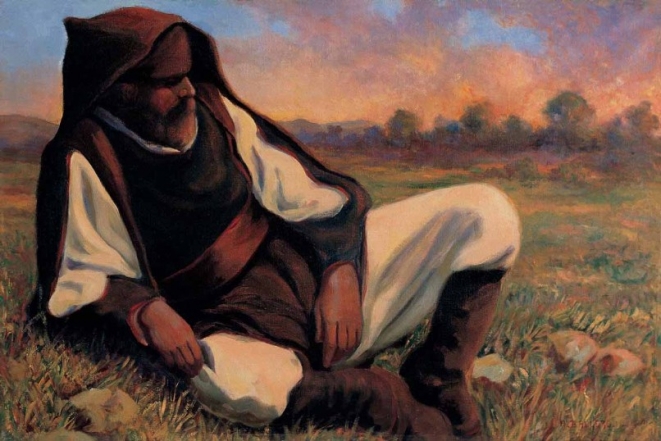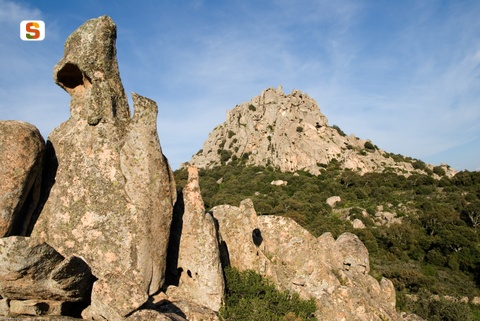Bastiano Tansu the bandit in love
Love, honor, revenge and blood. It seems that, since the beginning of times, the World rotates around them. Human feelings and passions, told in the farthest past in the epic and chivalric poems, in the modern times in the pages of crime news in the newspapers. We cannot take the feuds, that were all the rage in Sardinia in the Nineteenth and the Twentieth-Centuries, away from the romantic aura that impregnates them; we cannot consider them only as brutal murders, but it is necessary to analyze the passions that animated stories soaked of blood.
What happened in the Northern Sardinia, in Capu de Susu, indicates a situation with some outlines definitely different compared to the Southern Sardinia. We can consider Capu de Susu as a place that includes the whole territory of Nuoro and Sassari up to the confines with the Sea of Corsica, a place that little considered the geographic confines that were imposed and that have always had an administrative and not historical relevance; on the contrary, it felt to be a whole, although each village identified into itself, with the same rules and traditions, very different to those of de Capu e Giossu, in the Southern Sardinia.
Usual rules transmitted orally – the writer Antonio Pigliaru decreed them in twenty-three norms of the Code of Barbagia – that were always considered, by the “Capuesusesus” (the Northeners), binding in a definitely greater way compared to those of the Government. Norms that were provided of intrinsic legality and that were efficient and unique, provided of sacredness and superior than whatever precept, religious too.

This is the story of Bastiano Tansu, a personality with a mythical profile, born and lived in Aggius in 1827. With blonde hair and black eyes, sly and clever, Bastiano was mute since his birth, but, despite that, he could let others understand him through guttural sounds and the gestures by hands. He was described as a very clever and beautiful man, with blonde hair and black eyes, tall and slim. So, the Judge of Aggius, Celestino Concas, told about him: “The notorious deaf-mute bandit Sebastiano Rassu Addis Tansu, called "the Terrible", was a beautiful man who, at first sight, seduced. His eyes expressed a sublime intelligence, such that it was difficult to endure for a long time if you watched him: and me, who previously did not know him, I must confess that I was attracted by him by an irresistible sensation of liking, although I knew that he was tarnished of human blood; and I do not deny that I was sorry for his deafness and his muteness, because I could not talk with him”.
In his village he was considered a son of Devil, because he was different to other individuals because of his disability and because he was able to dictate his authority on other people through the strength of punches. The story of the cruel murderer has, as a frame, a wonderful summer day; in the territory of Aggius people were celebrating the engagement between Pietro Vasa, a cousin of Bastiano Tansu, and Mariangiola Mamìa. Bastiano was not happy for this relationship and he was aside while he observed the crowd that enjoyed; he perceived that the time of death was open.
After one year, the engagement was loosened with a lot of dishonor for Mariangiola. AntonPietro Mamìa, Pietro Vasa’s father-in-law, had asked to who would have been become his future son-in-law, to stop the hostility with the Pilleri Family - kin of the Mamìa Family – who had a conflict previously with Vasa Family for the trespass of some goats. “It could not be enemies forever for such a futile reason” AntonPietro Mamìa said. He was wrong. Not only it was possible to be enemies forever, but for something that was worth little they would have overflowed a lot of blood. The first victim who died was Michele Tansu, Bastiano’s brother, who would have punished the attempt of murder of his cousin Pietro Vasa by the Mamìa Pilleri, dishonored for the missed marriage. The second one was Michele Mamìa, bride’s brother.
He was still a young boy. He was described as a beautiful blonde angel, hit under the hot sun of the Feast of the Assumption. The man who shot him, it is said, was the Mute. The death of a child, also in such a cruel scenery, was considered an unacceptable event such that it could be vindicated only with another of the same level, the murder of a woman. So it was the turn of Pietro Vasa’s mother. In a whirlwind of dead and suspect individuals, not few people became fugitives before justice could chase them. After the death of AntonPietro Mamìa in an ambush to which twenty hit men took part, Aggius and the adjacent areas were devastated by about seventy murders.

There was an armistice when on May 26th 1856, on the clearing of San Sebastiano, each member of the families implicated in that very cruel feud, gathered on a stage, under a majestic crucifix, at the presence of civil and religious authorities.
On the one side the Vasa Family, on the other side the Pileri Mamìa Family. When homily finished, the divisions went towards each other, each one embraced and kissed who was in front of him. So, in a way that was as Christian symbolic as childish, the peace was signed.
Bastiano Tansu the Mute did not take part to that celebration that was as joyful as anguishing of which he did not hear the echo either in the deaf ears or in the heartlessness.
The Dumb’s life changed completely when he received hospitality by the Antonstefano Pes’s Family that lived in a pen in L’Avru, a place with a breath-taking charm, defended on a slope that plunges, through its luxuriant green, in the most blue sea surrounded by the Asinara island and by the cliffs of Corsica.
The Dumb was housed in the family through a strong friendship and respect, given that he guaranteed defense and he had the golden hands. In that tranquil period spent in L’Avru, Bastiano amused making small and big artisan works, for instance stuffing the chairs and manufacturing leather.
A happy period above all for the presence of AntonStefano Pes’s daughter. Francesca was a beautiful young girl who was fifteen years old when the bandit came to the father’s home. Between them there was immediately a harmony and Francesca, maybe for passion or maybe only for her exemplar diligence, but probably since she felt a lot of fondness, she always had special consideration for Bastiano.
In a world where passions and feelings are suffocated by the dark of escape that eclipses also the most honest hearts, love did not come late and for the bandit it was the most beautiful period of his life.
“Love, that denial takes from none beloved" Dante wrote. And it is exactly true that it is impossible to answer fatally to love if not through love, such that also the spirits tarnished by the most shady crimes, can, like the magnets, attract the feeling of another person, also that of a young girl with the immaculate heart. Bastiano had a veneration for Francesca such that every gestures, every thoughts, every movements that he did in the pen of L’Avru were for her.
For fun her mother repeated to the Dumb that when she had reached the age for wedding, the mother would have allow him to have her daughter as a wife. Sometimes the jokes, also the most innocent, can be fatal. As a proof of love, Francesca gave Bastiano a silk drawstring with a pendant illustrating Jesus and Virgin Mary. Through the actions, Bastiano made her understand that he would have removed it only when for him life would not have had a sense anymore. But the innocent love brought a rain of blood.
When the bandit came to the pen of the Pes Family, after a period of absence, when certainly he thought continuously to Francesca, the family housed him happily, and gave him the news of the engagement between Francesca and Giovannantonio. That involved necessarily a serious reshaping of that was only a friendship between them anyway, in front of the family. This new situation involved also the disappearance of Bastiano from L’Avru. The first one who died was AntonStefano hit to his chest by a bullet of which the wife was more responsible than the bandit. A missed promise with the name Francesca.
In the dawn of these days of blood, there was the death of Pietro Vasa and certainly of Bastiano Tansu, who felt himself die since the day of the wedding of Francesca, when he left the proof of love given previously by Francesca on the windowsill of the bride’s bedroom. Actually, we do not know when the Mute died and how. Maybe during an ambush organized by GiovannAntonio Mannu, maybe by Giovannantonio himself, or because of the efforts of a life spent in the dark of the Infarru, namely the hell of impenetrable woods of the mountains of Aggius. Other people tell that he died through a suicide. There is who tells to having met him in Corse where he had a new life, not having his life a sense as Bastiano Tansu anymore, without having Francesca Pes with him.